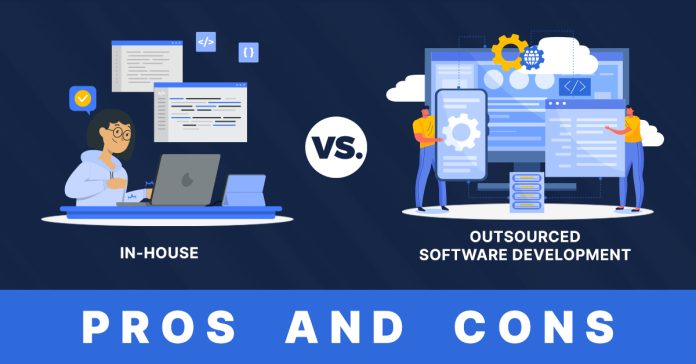As the world becomes increasingly reliant on smart technology, software development has emerged as one of the most profitable business ventures. However, assembling a top-notch team can come at a steep cost, leading many companies to consider outsourcing as a solution.
The global market for business process outsourcing is projected to exceed $220 billion by 2020, highlighting the growing popularity of this approach. While both in-house development and outsourcing have their advantages and disadvantages, choosing the right IT outsourcing company can be the key to success in the ever-evolving world of technology.
What is In-house software development?
In-house software development, or insourcing, means creating software using your own in-house team of experts. This approach involves handpicking and hiring a team to work together to fulfill specific tasks. Although assembling a team may be a lengthy process, it can result in a dedicated and reliable team for future projects.
Benefits of opting for In-house Software Development
In-house development offers several advantages:
Complete control
When you hire an in-house software development team, you have complete control over their training and development, ensuring that they’re using the right tools to develop software that aligns with your company’s vision. Moreover, they’re more attuned to your company’s needs and can adapt to them more quickly than external specialists.
Direct communication
Working directly with in-house software developers at your company’s officemeans face-to-face interactions are less complicated than outsourcing. This means you can communicate more easily, make unexpected changes to the project faster, and reduce mistakes caused by miscommunication.
Hand-picked team members
Recruiting in-house team members is a bigger commitment than hiring an external staffing agency, so you’re likely to spend more time finding the right candidate. However, the recruitment process will be more thorough, and the person you ultimately hire will be a better fit for the role, leading to higher job satisfaction and better performance.
Challenges of opting for In-house Software Development
Even though it has its perks, It is important to acknowledge that in-house development isn’t without its challenges. Here’s a brief overview of some of the key issues with in-house software development that have contributed to the rise of outsourcing as a viable alternative:
High costs
Hiring and maintaining an in-house development team can be a substantial investment. In addition to equipment costs and salaries, you also need to factor in ongoing training and development expenses. This long-term commitment can be expensive, especially for startups and small businesses.
Limited talent pool
When hiring in-house, you are restricted to a smaller pool of candidates, which can make it challenging to find the right fit for your team. Furthermore, you may miss out on top talent from other regions or countries that could bring unique and valuable perspectives to your organization. This can limit your ability to take on complex or specialized projects that require specific skill sets.
What is Outsourcing software development?
Outsourcing software development involves hiring an external teamfor your development requirements, saving time and money. With access to a global talent pool, it’s an ideal option for finding specialized expertise that is relevant to your project need.
Benefits of Outsourcing Software Development
Here are some of the key advantages of outsourcing your software development:
· Cost reduction
Software development outsourcing eliminates the need to provide additional workspace or equipment for the development team. Also, you only pay for the services that you require, and if your budget requires changes, you can quickly adjust your team size and pricing models. Additionally, you can choose from a wide range of outsourcing partners and pick the one that best fits your budget and project requirements.
· Increased productivity
Software development outsourcing allows you to engage professionals specialized in specific areas, so you don’t have to spend time and resources on their training. As a result, the professionals you hire can start working on your project immediately, significantly improving efficiency and productivity.
· Wide talent pool
The internet has made it possible to access the best talent in any field from anywhere in the world. With outsourcing, you can choose from a diverse pool of experts in different areas of software development, without being restricted by geographical limitations.
Challenges of Outsourcing Software Development
Outsourcing software development has its own set of potential drawbacks. Here are a couple of key points to consider:
· Communication challenges
With outsourced teams, communication is primarily carried out through digital channels which may lead to miscommunication. Working with individuals who speak different languages can exacerbate this issue, making effective communication challenging. Also, due to misinterpretation can cause a different outcome than expected of your requirement.
· Higher security risks
Outsourcing your project development may require sharing confidential information with third-party companies, resulting in the risk of exposing sensitive data to unwanted parties. While non-disclosure agreements are typically signed before starting any work, thorough research on your potential software development outsourcing partner is crucial to avoid any mishaps.
In-house vs outsourcing software development: decision points
When deciding between in-house and outsourced software development, there are severalfactors to consider. Here are some key decision points:
· Costs and resourcing
While outsourcing may seem like the cheaper option, the real question is about cost-effectiveness and return on investment. Internal projects involve sunk costs, such as employee salaries, and your goal is to maximize the value. Outsourcing can often provide a more cost-effective solution for software development projects, as it allows companies to leverage the expertise of external teams without the overhead costs of maintaining an internal team.
· Communications and project management
Internal projects tend to be more efficient in terms of communication and project management, which reduces the risk of errors and improves the team’s ability to meet project needs. Outsourcing software development can bring fresh perspectives and diverse skill sets to your project that can lead to increased creativity and authenticity. However, clear communication and solid project management are vital to ensure that project requirements are met on time and within budget.
· Control and accountability
The degree of control and accountability you have over the development process is a critical decision point. In-house teams offer greater control over technical and project-related decisions, finances, timelines, resourcing, and strategy, as well as clear lines of accountability. On the contrary, outsourcing software development can allow you to leverage specialized expertise and focus on your core business activities while streamlining the development process by entrusting a single point of contact with managing the project.
· Security and confidentiality
Security concerns can be a driving factor in the decision to go in-house or outsource your software development requirement, particularly for projects involving sensitive or confidential information. Extra vetting processes, using dummy data, and specific certifications may be necessary for outsourced projects.
Final thoughts
In today’s digital age, software development companies providing outsourcing services are becoming increasingly popular due to their ability to save costs and quickly yield solid results. With access to a vast pool of talented individuals worldwide, distance is no longer a hindrance to finding the right team for your project.
Ultimately, outsourcing software development can be a highly effective strategy to create innovative, cutting-edge solutions. Consider the opportunities and limitations of both approaches, in-house and outsourcing software development, to determine which one best aligns with your project goals.




















![TamilMV Proxy List Top 30+ [Unblock TamilMV Sites] TamilMV Proxy Unblock](https://technewsgather.com/wp-content/uploads/2023/04/17825836_SL-121019-25870-14-1-100x70.jpg)